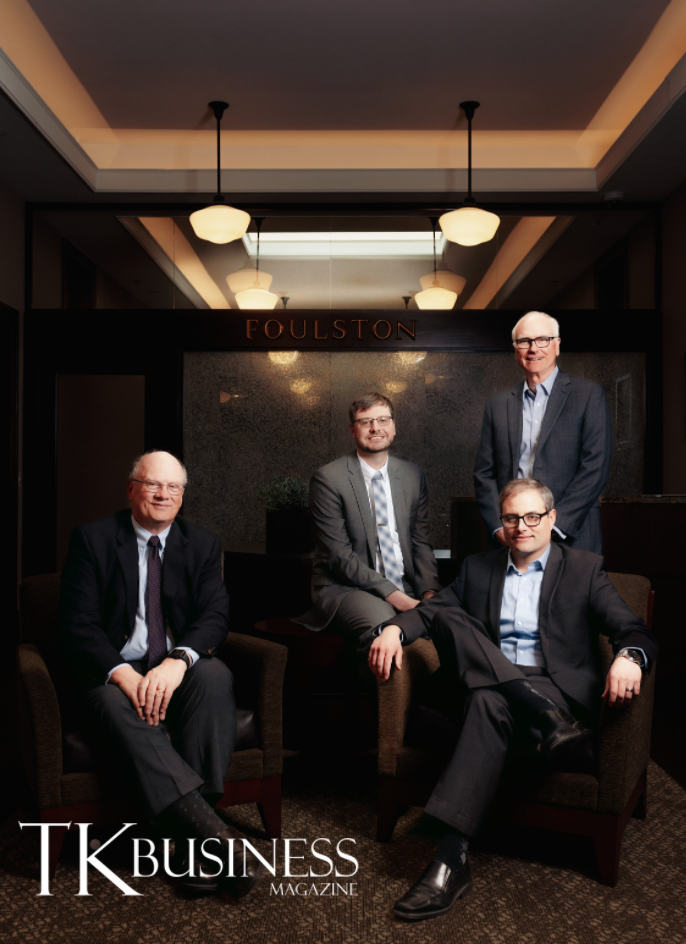Building a Legacy: More Than 100 Years In The Making
Photos by: John Burns
The capital city branch of Foulston moved into its new offices above Brew Bank in downtown Topeka about a year ago.
Jeremy Graber, the current partner in-charge in the Topeka firm, said it has been exciting to be part the of the energy happening downtown with Evergy Plaza, the Cyrus Hotel and other new businesses moving in.
“It’s been fun watching downtown come alive,” Graber said. “When I first started here, it was four lanes up and down Kansas Avenue, and it was a ghost town after about 5 p.m. Over the last decade, it’s been fun seeing that all change.”
The Topeka firm has 12 employees and four attorneys. While the firm often deals with clients’ needs as they relate to state agencies, the legislature, the attorney general’s office and other government entities, Graber said, much of their work is similar to that of the other Foulston locations.
“We are here to help people,” Graber said. “Just like Foulston Siefken has been doing for the last 100 years. We show up every day and help our clients get through what may be a challenging time for them, whether it’s litigation or the loss of a family member. We take on the weight of our clients’ problems and do what we can to make their lives a little better.
A 100-YEAR-OLD STORY
The year is 1919. Woodrow Wilson is president. World War I has just ended. Prohibition and women’s right to vote are on the forefront. And in Wichita, Robert Foulston and George Siefkin joined up to form what is now the largest Kansas-based law firm, Foulston Siefkin LLP.
Today, the widely respected regional firm has nearly 90 lawyers—about 55 of whom are partners—serving local, national and international clients with offices in Wichita, Topeka and Overland Park. The full-service firm offers legal services in nearly all areas of law except for family law and criminal law.
But like many storied institutions, things started small for the law firm well over 100 years ago.
As the firm tells it, Foulston was up on a ladder one day learning carpentry when he thought, “There has to be a better way to make a living than this.”
He climbed down off the ladder, told his family he was doing something different with his life, and began taking classes at the University of Kansas.
After graduating law school, a Wichita businessman offered Foulston a small law office but no clients. A short time after that, Foulston began serving as city attorney for the City of Wichita.
SETTING A PRECEDENT
Foulston’s first big case came when the Wichita Water Company sued the City of Wichita for more than $2 million. A New York City firm defeated the city and the young attorney at trial, but on appeal, with his new partnership with Siefkin, the up-and-coming duo had the verdict overturned. History shows this to be an important win for the young firm.
“They established the culture of the firm early on, which was, we work together as a unit,” said Tammy Allen, the firm’s chief marketing officer. “We don’t compete against each other. We work together to benefit our clients. That’s something that carries through today.”
“When you go back to when this first started in 1919, there were no zoning laws in Wichita at that time,” said Jim Oliver, a partner who has been with the firm for 46 years. “Foulston and Siefkin handled some of the first zoning cases on what you could do to keep a hog lot out of your backyard, and how you develop a modern city. We represented the city for many years back in those days. And we still continue to do a lot of work for government.”
Both attorneys had a hand in the formation of major local companies. Siefkin co-founded and incorporated Stearman Aircraft Company until it was acquired by Boeing in 1934. At that time, Siefkin became general counsel for Boeing’s Wichita division, which later became Spirit AeroSystems.
As for Foulston, he knew W.C. Coleman through Bible study class and helped found the Coleman Company, which was initially known for its lanterns, and today has become a well-known international outdoor recreation product manufacturer.
Foulston and Siefkin’s strengths included the ability to attract and train talented lawyers. From the start, the firm was known for having attorneys serve in the community and on charitable boards to give their time, talents and resources.
“When I started, I was amazed at the reverence with which everyone talked about Robert C. Foulston and George Siefkin,” Oliver said.
Oliver told of how Foulston always wore his suit coat in the office.
“He thought it was too informal to take it off and hang it up behind the door,” Oliver said. “Can’t be casual in the office. This was formal; this was serious business. He was such a great lawyer and such a wise man.”
Oliver described George Siefkin as a hugely talented lawyer with exceptional legal writing and argument skills, factfinding, logic, and business skills.
The firm withstood the obstacles of the war and Great Depression, but heart attacks took the lives of Foulston (age 58) and Siefkin (age 59) within seven years of each other in 1947 and 1954, respectively. The losses had many in the community calling into question whether the quick loss of leadership and reputation would be the end of the firm.
“For many firms, that would’ve shut it down,” said Tammy Allen. “That was a real turning point in the firm. It could’ve gone the other way. (The founders) were very young and had many years of leadership left. So that was a real shock.”
NEW LEADERS EMERGE
The firm needed strong leadership to survive, and it found it in partners like George Powers, John Eberhardt and Robert (Bob) C. Foulston II, son of the founder.
It was still a relatively small firm through the mid-50s. The firm hired Robert Siefkin, the son of George Siefkin, as well as a future managing partner, Jerry Sawatzky. And then, in 1959, the firm recruited Don Cordes and Bob Howard, from KU School of Law.
“They became the best lawyers of their generation for miles around,” Oliver said.
The practice of law changed continually in the 60s, 70s and 80s with lots of legislative enactments; people had to figure out new laws, Oliver said, referencing new legislation like the Truth in Lending Act, civil rights laws and employment laws. People had to become employment lawyers and tax lawyers and teach themselves to do securities law and represent public companies.
“We had people who became self-taught, top-level experts,” Oliver said. “And we’re able to pass it on to subsequent generations of lawyers.”
In 1975, the firm began to handle more and more larger transactions—like the sale of Cessna to General Dynamics—as mergers and acquisitions became common.
By 1980, the firm had 36 lawyers, four of whom were female. In the next two decades, Foulston litigators worked on several notable cases that the 10th U.S. Circuit Court of Appeals described as “the most complex litigation in the court’s history.”
FURTHER EXPANSION AND INNOVATION
Foulston is known for creating what some call the “rules of the road” for Kansas.
“We’ve tried to do various things over the years contributing to the development of the law in the state,” said Jason Lacey, partner with Foulston. “Whether that means helping to draft legislation or handling significant litigation that established legal principles. We’ve done that as part of our public service or as part of our interest in seeing the law develop in helpful and important ways.”
One example of this was with limited liability companies, which is a business structure that generally protects its owners from personal responsibility for its debts or liabilities. In 1990, Foulston’s Stan Andeel participated in the drafting and promotion of legislation for a professional LLC statute. Kansas was one of the first states to adopt the measure, and the firm’s health care practice expanded as a result, as it formed numerous LLCs for health care clients.
Since 1990, Foulston has seen much expansion and innovation:
• In 1991, attorney Jim Rankin, joined later by Jim Oliver, Tom Theis and Dick Hay, opened the Topeka office, thanks to client demand in the community and at the Kansas Capitol, as well as for state administrative and regulatory agencies.
• In 1995, a merger with a law firm in Dodge City established a branch for a time in western Kansas.
• In 2001-02, Doug Reagan opened the Overland Park office and was joined there by Jim Oliver, Jim Logan, Bill Trenkle and John Peck (splitting time as a KU law professor).
• In 2005, the firm moved from its longtime downtown Wichita home to the new Commerce Bank Center in the Waterfront development in Wichita.
During the 2000s, the firm expanded and deepened its work in many emerging areas of practice, including trade secret litigation, intellectual property, cybersecurity, and wind energy. The firm built one of the only full-service health law teams in Kansas, advising on regulatory, licensing, compensation, litigation, mergers and acquisitions, general business and tax matters for health care organizations.
Today, the firm is on strong footing and well-positioned, Lacey said. The strategic question the firm often asks itself is whether they get bigger to compete with massive firms or if they should focus on legal work that allows the firm to be nimbler and more flexible.
Competition for talent has grown both for legal talent and nonlegal staff, Lacey said, and Foulston is always trying to look ahead and anticipate what the firm needs so it doesn’t get caught flat-footed.
“Twenty years ago, if you wanted to live in Kansas and work as a lawyer, you worked for a law firm in Kansas,” Lacey said. “But now, if you want to live in Kansas, you may be able to work for a law firm in New York or Florida or L.A. or Chicago because remote work has changed the traditional workplace.”
Regardless of the evolving landscape in business and law, Lacey is optimistic about the future of the firm.
“Taking an organization-first approach has been key to why we’ve gotten to be where we are today and hopefully why we’ll be here another 100 years,” he said.






